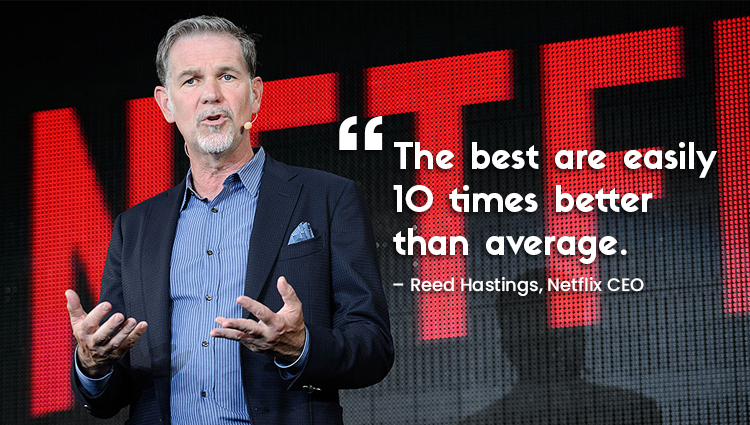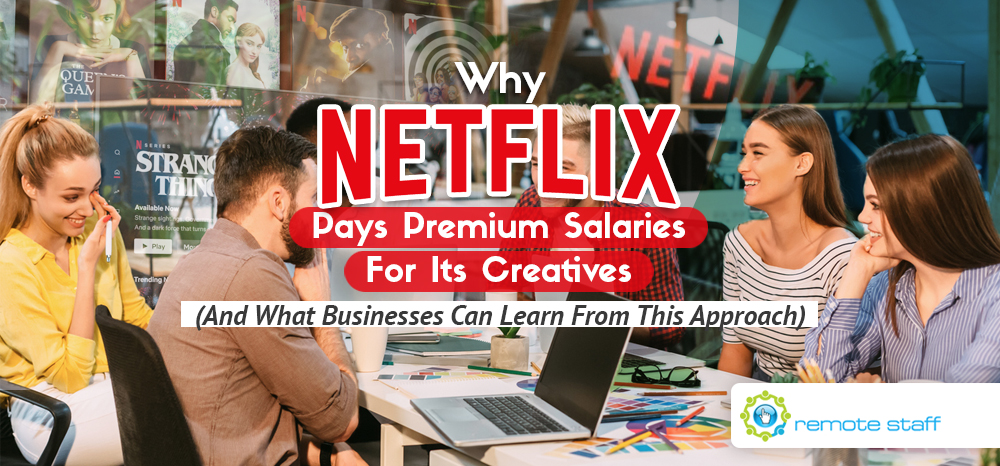The workplace as we know it may have changed drastically over the past year, but compensation remains a tricky topic.
As someone who works remotely and with foreign clients, I get it. My clients outsource to me for two major reasons: to get the job done and to save on costs. While it might sound exploitative, I still manage to make a decent living because the exchange rate makes my client’s $$$’s go much further here.
Though, of course, I prefer to base my compensation on the value I bring to the table rather than where I live. Fortunately, the clients I’ve worked with so far are happy to meet me halfway.
But Netflix certainly takes the cake. They make it a point to pay their key roles sky-high salaries.
Let’s take a look.
The Rock-Star Principle

You might have heard of rockstar remote employees. If you go to any remote jobs portal, you’ll see this in a lot of job descriptions. “Looking for a rockstar VA.” “Our team needs a rockstar graphic artist.” “We need a rockstar copywriter.”
What’s with the verbiage? Well, it all started with a famous study that took place in a Santa Monica, California basement. Nine trainee programmers took part in a series of coding and debugging tasks that they had to complete within 120 minutes.
The researchers were expecting the best one to outperform their average counterpart by at least twice as much. Instead, the most skilled programmer ended up outperforming the worst one by a mile. Several, in fact. He was 20 times faster at coding, 25 times faster at debugging, and 10 times faster at program execution than the programmer with the lowest marks.
Who wouldn’t want someone like that on their team, right? Imagine how much more you could get done with just ONE rockstar programmer as opposed to several mediocre ones.
The trouble is, most employers who want one aren’t willing to pay rockstar wages.
Not Netflix, though, and they’re reaping the benefits of this approach.
Netflix: “The best are easily 10 times better than average”

While the rockstar principle originated in the software industry, it can apply everywhere else. Reed Hastings, the CEO of Netflix, takes it to heart.
“With a fixed amount of money for salaries and a project I needed to complete, I had a choice: Hire 10 to 25 average engineers, or hire one “rock-star” and pay significantly more than what I’d pay the others, if necessary,” he said. “Over the years, I’ve come to see that the best programmer doesn’t add 10 times the value. He or she adds more like 100 times.”
On the other hand, Hastings and then-Chief of Talent Patty McCord, don’t necessarily apply this principle to all the roles. Instead, they first divided jobs into operational and creative ones.
Operational roles are also important since they help the company function. However, there’s a cap on the value that an operational role, no matter how exceptional, can provide. So, for these roles, Netflix pays the industry average and does just fine.
Then again, the company doesn’t have a lot of operational roles either. Majority of their posts rely on an employee’s ability to innovate and execute creatively. “In all creative roles, the best is easily 10 times better than average,” Hastings said. “The best publicity expert can dream up a stunt that attracts millions more customers than the average one.”
“…For all creative jobs we would pay one incredible employee at the top of her personal market, instead of using that same money to hire a dozen or more adequate performers. This would result in a lean workforce. We’d be relying on one tremendous person to do the work of many. But we’d pay them tremendously.”
Netflix has relied on this approach ever since, and it’s served them well. Not only did it enable them to increase their innovative output at record speed, but it also streamlined their workforce.
Key Takeaways
To wrap things up:
1.) You get what you pay for, talentwise.

Some business owners pride themselves on being able to low-ball remote workers. While this can be beneficial to your bottom line in the short term, it WILL get in the way of your desire to attract top talent, especially if they happen to be rockstars in a creative and highly sought after field.
Sure, you can always find someone who’ll be willing to do the job for less. But there will also always be another company willing to offer double or even triple someone in your company who is worth it.
2.) Know when to bargain, and when to offer a premium.

credit, investment or fundraising financial concept, money to start business project startup
Not all roles are made equal. If they were, salaries should be largely the same across the board.
So, you don’t have to pay EVERYONE sky-high salaries. Does a certain role bring a unique advantage to your business? Is the talent occupying that role hard to replace?
If the answer to those questions is “yes,” the sky’s the limit. Otherwise, the going rate should be just fine.
3.) Focus on the value an employee’s work adds, above anything else, whenever possible.

Honestly, there’s no telling exactly how valuable a rockstar employee is. Apart from turning in exceptional output that’ll propel your business forward, focusing on quality instead of quantity can result in leaner teams and a smaller organisation.
Small teams with heavy-hitters require very little supervision. Their managers would have fewer people to manage, so they’d do a better job. This then creates a domino effect. When the individuals perform well, their managers are free to level up, and the whole team (and company) can scale up better, faster, and easier.
How much is that worth to you?
Right, if the people at Netflix ever come across this and need a content or copywriter, my details are right below. *wink*wink*
Serena has been working remotely and writing content for the better part of the last decade. To date, she's written for Pepper.ph and Mabuhay Magazine, among others, and has churned out more than a thousand articles on everything from The Basics of Stock Market Investing to How to Make Milk Tea-Flavored Taho at home.





















